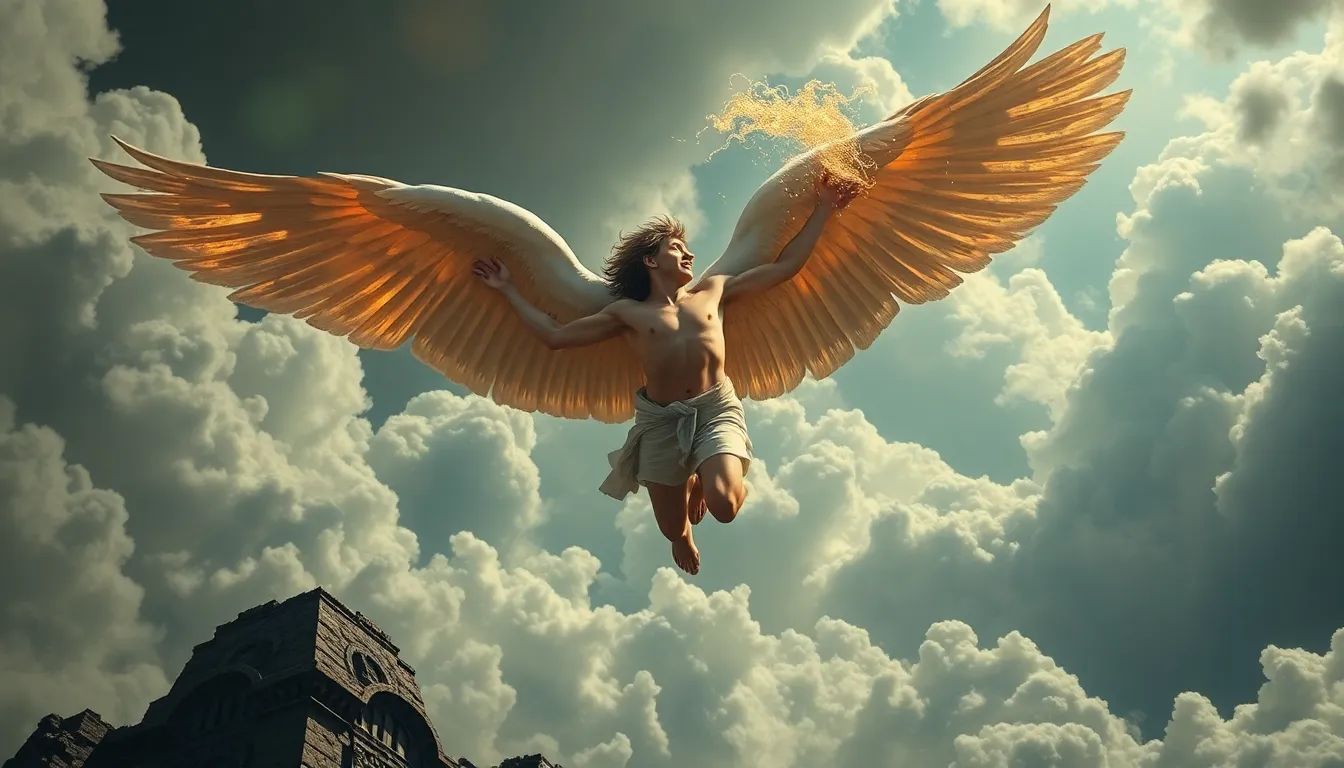The Tragic Flaw of Icarus: Understanding His Downfall
I. Introduction
The myth of Icarus and his father Daedalus is a timeless tale that encapsulates the themes of ambition, innovation, and the tragic consequences of hubris. This story, originating from ancient Greek mythology, serves as a cautionary tale about the dangers of overreaching one’s limits. In classical literature, tragic flaws—known as “hamartia”—play a crucial role in the narratives of heroes and their eventual downfalls. This article aims to explore the tragic flaw of Icarus, focusing on how his hubris led to his demise.
II. The Myth of Icarus: A Brief Overview
The tale of Icarus begins with his father, Daedalus, a master craftsman and inventor. They were imprisoned by King Minos of Crete and devised a daring escape plan using wings made from feathers and wax.
A. Background of Icarus and Daedalus
Icarus was the son of Daedalus, who was known for his incredible intelligence and creativity. After building the labyrinth that housed the Minotaur, Daedalus found himself and his son trapped in the very maze he had designed.
B. The creation of the wax wings
To escape their imprisonment, Daedalus crafted two pairs of wings from feathers and wax. He cautioned Icarus to follow his instructions carefully to ensure their safety during the flight.
C. The escape from Crete and the flight towards freedom
As they took to the skies, Icarus experienced the exhilaration of flight, soaring high above the waves. However, the thrill of freedom soon became a dangerous temptation.
III. Defining the Tragic Flaw
In literary terms, a tragic flaw is a character trait that leads to the downfall of the protagonist. This concept, known as “hamartia,” is central to many Greek tragedies.
A. Explanation of the concept of hamartia
Hamartia refers to a mistake or error in judgment, often stemming from a character’s inherent flaws. It is this flaw that sets the stage for their tragic end.
B. Exploration of common tragic flaws in literature
- Hubris: Excessive pride or self-confidence.
- Greed: An insatiable desire for wealth or power.
- Passion: Overwhelming emotions that cloud judgment.
C. Icarus’s hubris as his primary flaw
In the case of Icarus, his hubris emerges as the primary tragic flaw. His overconfidence leads him to disregard the warnings of his father.
IV. The Role of Hubris in Icarus’s Downfall
Hubris is a significant theme in Greek tragedy, often resulting in dire consequences for characters who overestimate their abilities.
A. Definition and significance of hubris in Greek tragedy
Hubris is defined as excessive pride or self-importance, often leading individuals to challenge the gods or ignore their limitations. In Greek tragedies, this flaw typically results in a tragic end.
B. Icarus’s disregard for warnings from Daedalus
Despite Daedalus’s explicit instructions to fly at a moderate height, Icarus’s desire for glory compels him to ascend toward the sun. His reckless disregard for his father’s advice serves as a pivotal moment in the myth.
C. The implications of Icarus’s overconfidence during flight
As Icarus flew higher, he felt invincible. However, this overconfidence would soon lead to catastrophic consequences, as the sun melted the wax holding his wings together.
V. Symbolism of the Flight
The flight of Icarus is rich in symbolism, representing various themes of ambition and consequence.
A. The wax wings as a representation of ambition and innovation
The wax wings symbolize mankind’s desire to reach new heights and defy limitations through innovation and creativity.
B. The sun as a symbol of unattainable ideals
The sun represents the ultimate aspiration—the pursuit of unattainable goals that can lead to one’s downfall if pursued recklessly.
C. The descent as a metaphor for the consequences of overreach
Icarus’s fall signifies the tragic outcomes of overreaching and the inevitable consequences that follow when one ignores their limitations.
VI. The Impact of Icarus’s Choices
The choices made by Icarus have far-reaching consequences, affecting not only himself but also his father, Daedalus.
A. Analysis of the consequences of Icarus’s actions on himself and Daedalus
After Icarus’s tragic fall, Daedalus is left to mourn the loss of his son, feeling the weight of guilt for having crafted the wings that led to Icarus’s downfall.
B. The broader implications of individual choices in the face of ambition
Icarus’s story serves as a reminder of how individual choices can have significant repercussions, not only for oneself but also for those around them.
C. Reflection on the lessons learned from Icarus’s story
The tale of Icarus encourages reflection on the balance between ambition and caution, urging individuals to consider the potential costs of their aspirations.
VII. Contemporary Interpretations of Icarus’s Tragic Flaw
The myth of Icarus continues to resonate in modern literature and art, illustrating the timeless nature of his story.
A. Icarus in modern literature and art
Many contemporary works reference Icarus as a symbol of ambition and the risks associated with striving for greatness.
B. Parallels to contemporary figures and their downfalls
Modern figures in politics, business, and entertainment often exemplify the tragic flaw of hubris, leading to their downfalls and serving as cautionary tales.
C. The relevance of Icarus’s story in today’s society
In today’s fast-paced world, the lessons from Icarus’s story are more relevant than ever, reminding us to be mindful of our limits and the consequences of our ambitions.
VIII. Conclusion
The tragic flaw of Icarus, primarily his hubris, serves as a poignant reminder of the dangers of overreaching ambition. His story highlights the importance of heeding warnings and recognizing our limitations. As we reflect on Icarus’s downfall, we are encouraged to examine our own ambitions and the boundaries we must respect to avoid similar tragedies.




